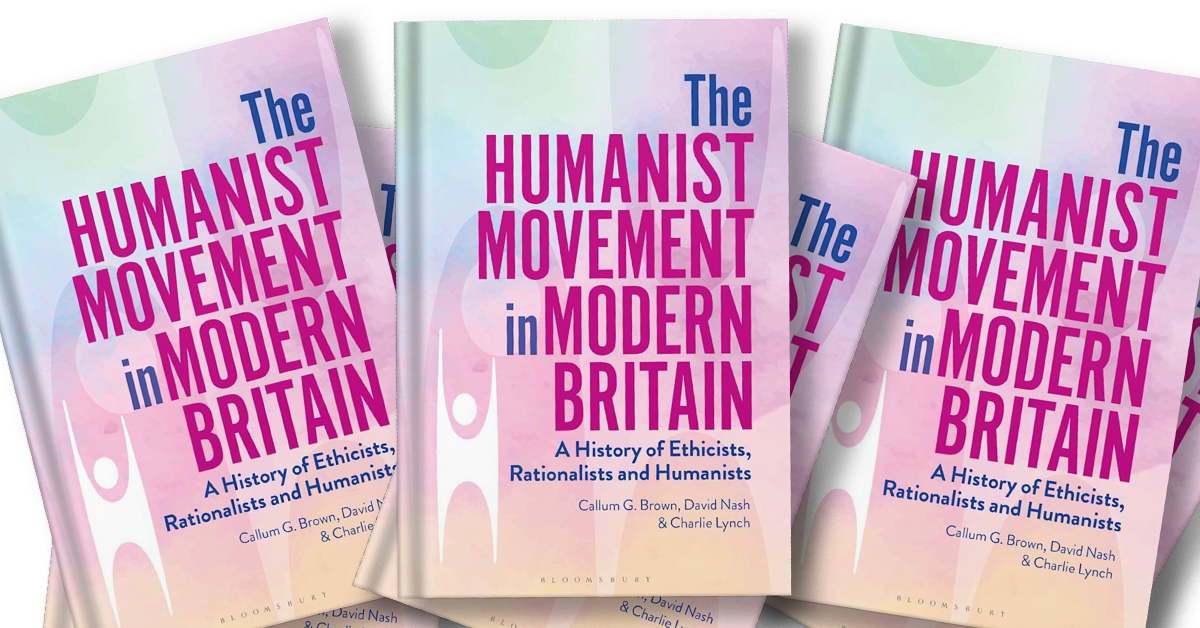
The story of how humanist organisations helped to shape changes to the law, culture, and social fabric of modern Britain has finally been told in a brand new history book: The Humanist Movement in Modern Britain: A History of Ethicists, Rationalists and Humanists. Assembled by leading historians Professor Callum G. Brown, Professor David Nash, and Dr Charlie Lynch, it is the newest contribution to a growing body of research into the remarkable influence of humanist thought on today’s ‘common sense’ values in the UK, and the active role played by humanists in ushering in a vast array of the last century’s progressive social reforms.
The Humanist Movement in Modern Britain zeroes in on the 125-year history of Humanists UK itself, charting the organisation’s growth from the small band of Victorian ‘ethical’ warriors who formed the Union of Ethical Societies through to today’s organisation with over 100,000 members and supporters. An independent work of serious history, it looks fearlessly at the movement’s changing approach to organising humanists – often compared with herding cats – along with its many milestones, successes, and failures. Along the way, it unearths affecting stories of surprising triumphs, unexpected losses, and activists with a relentless resolve to improve society.
The book, say its authors, sets out to create a definitive account of the development of the humanist movement within the history of the non-religious in Britain, and to recognise that humanism has been ‘the leading feature’ of a wider social movement that has changed society in innumerable ways. From a relatively small formal membership in 1896, it tells of how the organised humanist movement grew rapidly, and wielded enormous – if often overlooked – influence. ‘In the midst of secularisation,’ the authors suggest that
‘[humanism’s] mixture of science, rationality, and an evolving ethical standpoint offered an alternative to the moral power of the churches, achieving an astonishing, for some bewildering, influence in international affairs and domestic social policy.’
As well as touching on ongoing humanist concerns such as faith schools and assisted dying, The Humanist Movement uncovers the role of humanism and of humanist activists in bringing about significant shifts across areas like healthcare, sexual and reproductive freedoms, human rights, and the education system. The Humanist Movement in Modern Britain uses extensive archival research, as well as oral history interviews, to offer new ways of thinking about how we got to where we are today.
In a foreword to the book, Humanists UK Vice President Professor Alice Roberts said:
‘Though there’s a very long history of humanistic thought, going right back to ancient Greek and Indian schools of philosophy, there’s also a more recent history, from the twentieth century to the present day, which shows how humanism – as a movement – grew in confidence, and has had a real impact on philosophies, values, and morals in wider society.
‘The history of humanism in Britain throughout the twentieth and into the twenty-first century is a truly extraordinary one. It’s here, within these pages. And we’ve come a long way in just a century and a quarter.’
Humanist Heritage Coordinator Madeleine Goodall welcomed the book, saying:
‘We are delighted to see this rich and honest history of the humanist movement published by three leading historians of humanism in the UK. The book, much like the archival discoveries and oral history interviews which comprise it, adds colour and depth to our understanding of humanist history – for general readers and academics alike – and introduces many unsung heroes and overlooked achievements.’
Academic and publishing interest in the history of humanism continues to grow. In 2021, Humanists UK launched its Humanist Heritage programme to put more of its own history on the web and stimulate further interest. In 2022, Queen Mary University, London and Humanists UK played host to a groundbreaking academic conference on humanist history. In 2023, Humanist Heritage was awarded over £160,000 by the National Lottery Heritage Fund to continue its work.
Notes
For further comment or information, media should contact Humanist Heritage Coordinator Madeleine Goodall at madeleine@humanists.uk.
In 2021, Humanists UK celebrated its 125th anniversary with a renewed focus on its history. The Humanist Heritage website is a rich and growing resource that uncovers the untold story of humanism in the UK – a story of people, groups, objects, places, movements, publications, and ideas.
Humanists UK is the national charity working on behalf of non-religious people. Powered by 100,000 members and supporters, we advance free thinking and promote humanism to create a tolerant society where rational thinking and kindness prevail. We provide ceremonies, pastoral care, education, and support services benefitting over a million people every year and our campaigns advance humanist thinking on ethical issues, human rights, and equal treatment for all.
Similar stories:
- Humanist Heritage awarded Heritage Fund grant to bring humanist history to new audiences
- Humanist history takes centre stage as Sarah Bakewell awarded Rosalind Franklin Medal
- Heroines of freethought: women of the early humanist movement
- Groundbreaking academic conference explores far-reaching history of humanist thought
